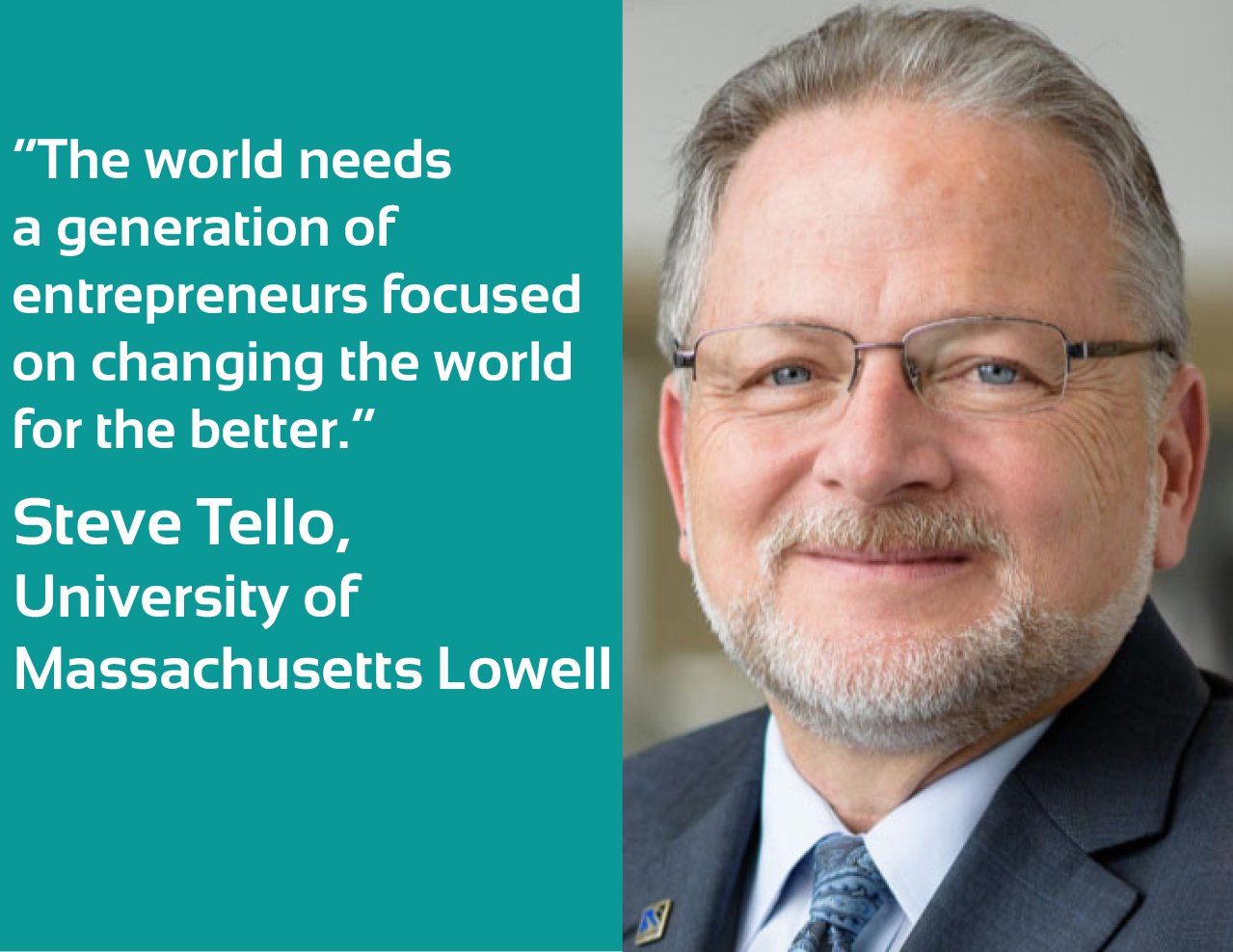
This week we continue our series highlighting educators within the VentureWell network who are doing good work—faculty members that are challenging norms in higher education and inspiring students to impact the world through invention.
This month’s faculty spotlight is Steve Tello, Senior Associate Vice Chancellor for the Office of Entrepreneurship & Economic Development, and Associate Professor of Management & Entrepreneurship at University of Massachusetts Lowell. These joint appointments allow him to combine his passion for teaching with research, examining how to best promote the commercialization of emerging technologies, and the engagement of students in entrepreneurial exploration. Tello is an active member of VentureWell’s community, participating in Pathways in Innovation and National Innovation Network (NIN) programs, and serving as a Principal Investigator for a Faculty Grant and a presenter at our OPEN conference.
How did you get interested in teaching entrepreneurship?
I have always been interested in how technology can be used to improve people’s lives. Before working in higher education, I managed several National Institute on Disability and Rehabilitation Research (NIDRR) programs that examined how different technologies could assist people with disabilities. Later, when the Internet evolved, I began exploring how this technology could be used to increase access to information and education. Along this path, I realized there was a need to link those who develop new technologies with people who can get it out to customers and clients. For me, this is what entrepreneurship is about – connecting those who invent with those who market and disseminate new ideas, technologies, and products. When I joined the Manning School of Business in 2005, I realized that teaching entrepreneurship allowed me to bring business, science, and engineering students and faculty together around product, business, and value creation.
What is your favorite thing about teaching?
I enjoy sharing in the growth of our students and exposing them to new ways of viewing the world around them. Students typically come to the University with a perspective or frame for viewing the world, informed by their families, neighborhood, and early education. As an educator, my job is to share different ways of viewing the world while providing a toolkit that allows them to adapt to the unexpected changes and challenges they will encounter in life. Entrepreneurship provides one set of tools for understanding these challenges and focusing on opportunities.
Where would you like to see the field of entrepreneurship in five years?
I would like to see an expanded focus on social entrepreneurship: doing well while doing good. This approach appeals to our students, and the world needs a generation of entrepreneurs focused on changing the world for the better. I also believe it’s important for business schools to open their doors and curriculum to the rest of the campus. Engineering, nursing, psychology, and fine arts students can all benefit from learning the entrepreneurial tool kit. Sometimes our disciplinary walls and standards prevent students from accessing this tool kit.
What traits make for great teachers, advisors, and mentors?
Great teachers, advisors, and mentors have passion for their student’s success. They get excited about student’s achievements and puzzle over their challenges. They may see a bit further down the road than their students and teams, and they use this insight to guide their growth.
What books on entrepreneurship and innovation have you been reading lately?
Right now, I am working through a chapter in Jerry Engel’s Global Clusters of Innovation. UMass Lowell is fortunate to exist within the life science supercluster in Massachusetts, so I would like to complement our “boot on the ground” projects (Innovation Hub, M2D2, DifferenceMaker) with a more academic understanding of the cluster phenomena.
What’s your most useful classroom activity or assignment?
My favorite activity is the “Tinker Toy Challenge”. We use this exercise to engage students who have not yet worked together in creative problem-solving and teamwork. Tinker Toys are sorted by piece and color into separate bags and tucked under chairs or placed on a table. Matching colors/pieces are placed together. Students typically come into the room and sit with their friends, who each have the same color Tinker Toys. We discuss innovation and entrepreneurship at UMass Lowell, introduce our DifferenceMaker program, and then present a challenge (e.g., build a vehicle that will transport a sick individual across rugged terrain). However, before students can start building, they have to build a team with students who have different color Tinker Toys in order to gather sufficient pieces to build the vehicle. Once they get through this “storming” phase, they can get to work.